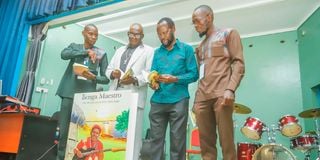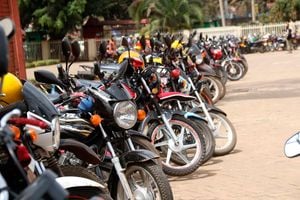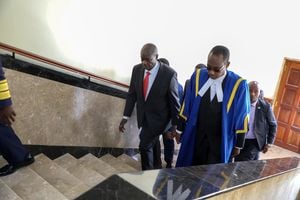Osito Kalle: Veteran guitar virtuoso with golden voice

Guest of honour Kisumu Governor Prof Anyang Nyongo, with authors of the book "Benga Maestro: The Life & Genius of Dr Osito Kalle", Okeyo Sojah and Aguta Onagi, during the launch of the book at Mama Grace Onyango Social Centre Kisumu on April 9, 2023.
Flashback to the 2021 Madaraka Day celebrations at Jomo Kenyatta International Stadium, Kisumu.
The entertainment program during the national event was headlined by a collaboration of artists known as Kisumu All Stars.
The star-studded lineup of artists from the lakeside has led a veteran who sent the stadium into raptures, with the sound of his infectious guitar and rousing vocals.
That guitar virtuoso with a golden voice was Dr Osito Kalle, and his career of more than four decades has been documented in a new book officially launched in Kisumu on April 9, 2023.
Benga Maestro: The Life and Genius of Dr. Osito Kalle is written by Okeyo Sojah and Agutu Onagi, two fans of the musician who worked on the book over three years of interviews with the musician.
“My first intention was to write an article based on our conversations with Osito, but my co-author, convinced me that this story was so profound that it had to be documented in a book,” says Okeyo.
“Osito himself warmly welcomed the idea and said that a book about him would be a great honour, “he adds. “He is the sort of person that you cannot sit with for more than five minutes without him telling a story.”
The book chronicles the story of the Benga crooner from Asembo Bay, Siaya County, who came to national fame in 1999 with the hit Asembo Piny Maber.
The song praises a land so beautiful, teeming with juicy mangoes, oranges and fish; the breathtaking topography, abundant with precious minerals and nestled next to the world’s second-largest fresh water lake, Nam Lolwe (Lake Victoria).
The opening chapter appropriately named after Osito’s signature song dwells on the cultural context of what he calls Asembo Republic, the history of his Kakia clan, the largest in the area, and, interestingly, how the name Kalle was acquired from a fierce and respected hunter called Lee.
Born Elly Mirasi Akumu in July 1958, his grandfather, who assumed the role of a parent while his father was away from the family, working in Kampala, predicted that the young lad was destined to be a music star as he sings in another of his hits Lesna Buoyo
As a young man, he played football at Memba Primary School, Central Asembo, inspired by the exploits of the legendary Brazilian Pele at the 1970 FIFA World Cup in Mexico. It was from his football skills that the young man earned the nickname Osito, a Dholuo corruption of “the star”
School
In 1976 he relocated to Nairobi and joined City Highway School, Kamkunji, Nairobi where he sat his Junior Secondary Examination.
Meanwhile, he became an understudy of Awino Lawi of Victoria ‘C’ Kings Band, who hailed from Gem, a few miles from Asembo, and was already a household name.
Even after completing his training in carpentry at the National Youth Service in 1981 and opening a workshop in Nairobi’s Ngomongo area, Osito’s love for music endured and he returned to Victoria C Kings to sharpen his skills as a guitarist and vocalist.
The book goes into great detail about the history of Benga, starting with the pioneer 1960s generation led by John Ogara, the golden years in the 1970s when record company executive, and later politician, Phares Oluoch Kanindo, used his connections to distribute the music of bands like the Victoria Jazz around Africa.
Eventually, the tumultuous years of the late 1970s and 80s resulted in the fallout between the two heavyweights, Dr Collela Mazee (Kanindo’s brother-in-law) and Dr Ochieng Nelly, and ultimately the Victoria Jazz Band splintered into two formations: ‘A’ and ‘B’. Lawi eventually bolted from Collela’s band and formed Victoria C Kings.
Meanwhile, Osito with his high-pitched vocals and a distinctive guitar-playing style left Victoria C in 1988 and returned home to Asembo just as Benga was enjoying a renaissance with newcomers led by Okatch Biggy who introduced a new variant of the genre enriched with heavy percussions and bass guitar, but containing mostly vulgar lyrics.
Dark chapter
The end of the 1990s was a dark chapter for Benga as luminaries like Osito’s mentor Awino Lawi, George Ramogi, Prince Jully, Ochieng Kabaselleh, Collella Maze and Biggy himself, all died in quick succession.
According to the book, Osito vowed to maintain a disciplined lifestyle and to carry on the legacy of Benga after the demise of the “kings”. It credits Dr Osito for remaining “moderate, measured and stoic” a rarity among his fellow stars.
“The only time his head swells a little is when overcome with the reverence for his lineage, he parades the family tree, more so his grandparents as he does in the song Osito Agalagala"
Osito reveals how he named his band Nabii Kings, dropping the suggestion for Victoria ‘D’ Kings, in honour of a prophet who prophesied at the court of the then Chief of Asembo, of, among other events the coming of the Europeans (Jarachar).
His first recording was at the little-known Tule Studios in Kericho in 1998, where he did Asembo Piny Maber after being turned away at the illustrious AP Chandarana Studios.
The crowning moment was winning the 1999 Benga Extravaganza in Nairobi when ecstatic fans honoured him with the honorific “Dr” following in the footsteps of the departed Collela Mazee.
“Osito is poetic and his lyrics are full of wisdom and education,” says Okeyo. “He has composed over 100 songs and each one is unique. Throughout 43 years in music, he has remained disciplined and dedicated to his music.” His co-author Agutu Onagi says Dr Osito has stayed the course for benga in its original form. “He is the only living member of the Benga Hall of Fame.”
Osito himself sums up the secret of his success thus: “Hard work, patience and discipline…I’ve always done my best to leave the stage at 3 am when every fan is satisfied with the dose of my medicine.”




